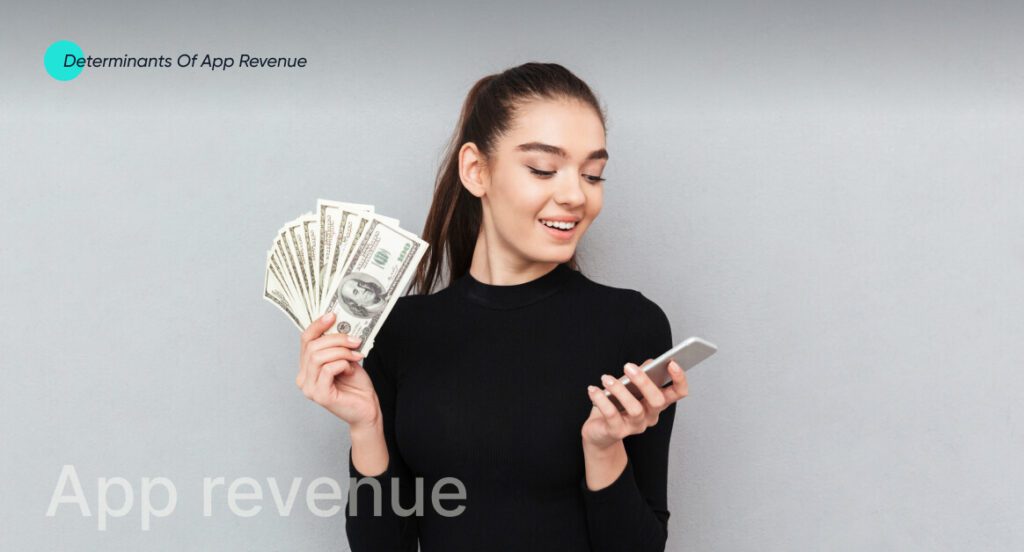How do you Choose an Effective App Monetization Strategy?
App monetization refers to the strategies employed by app owners to generate revenue from an app. An effective app monetization strategy is vital for increasing revenue and sustaining the growth of mobile applications. By strategically integrating various monetization models such as in-app purchases, subscriptions, advertising, and partnerships, app developers can generate income from their user base while retaining a positive user experience.
Significantly, the global app industry is booming! The Google Play Store features over 2.87 million apps for download, while the Apple App Store boasts over 1.96 million. According to research, mobile apps are expected to generate over $935 billion in 2023, with an estimated number of downloads numbering 258 billion.
The solution lies in comprehending your target audience, determining key features or content users are willing to pay for, implementing unintrusive advertising strategies, and consistently optimizing monetization based on user feedback and market trends. Ultimately, a sensible app monetization strategy can drive profitability and support ongoing development, innovation, and user engagement within the app ecosystem.
If you are an app owner and want to launch your app on Android or iOS to generate revenue, then you must choose a robust monetization strategy. This article highlights numerous app monetization strategies you can choose to generate revenue.
Let us help you in your quest to build a profitable app. See our Mobile App Development Servies ![]()
What is a Free App?
A free app is a software program that can be downloaded, installed, and used for free. It provides users access to various features, services, or entertainment without requiring upfront payment. Typically, these apps make money through advertising, paid subscriptions, and in-app purchases. Although the basic functionality of free apps is available to users, some free apps may offer additional paid features or optional in-app purchases. In addition, free apps receive many downloads, enabling them to obtain a massive number of users, and these apps are easily accessible through app stores or websites.
How do you Monetize Apps without Ads?

Here are some effective app monetization strategies that can provide you with a good mix of revenue streams.
In-app Purchases
Add features or content that users can unlock or access by making purchases within the app. It can include premium features, additional levels, virtual goods, subscriptions, or unique content packs.
Freemium Model
Provide a free version of your app with limited features or content and enable an option for users to upgrade to a paid version for enhanced functionality or exclusive content.
Subscriptions
Offer users monthly, quarterly, or yearly subscription plans, allowing them to access premium features or content.
Sell Digital Goods
You can also generate revenue by selling digital goods or services directly through your app. It could include e-books, online courses, music, videos, or art associated with your app’s goals.
In-app or Virtual Currency
Enable a virtual currency system in your app that allows users to make purchases with real money to access additional features available.
Affiliate Marketing
Through collaboration with other businesses and incorporating their products or services into your app, you can earn a commission for every purchase a user makes.
Sponsored Content or Partnerships
You can forge partnerships with brands or businesses to feature their products on your app. It can take the form of promotional content such as videos, articles, or campaigns.
Data Monetization
Assess anonymized user data and offer insights or reports to other businesses or advertisers to comprehend market trends, user behavior, and preferences.
White Labeling or Licensing
Suppose your app has a unique or valuable technology or feature, such as e-commerce, marketplaces, or communities. Consider licensing it to other businesses or developers who can incorporate it into their products for a fee.
How do you Choose an App Monetization Strategy?

Several factors have to be considered before choosing an app monetization strategy. Commonly, these factors include the goal and type of the business, target audience, and available resources. The following are some critical steps to help you choose a monetization strategy.
Analyze your Business Model.
The first step will be to start by comprehending your business model and how you plan to serve your target audience. What are you selling? Products, services, content, or something else? Who is your target audience? The deep consideration of these questions will augment the foundation of your monetization strategy.
Determine your Target Audience.
You must identify your target audience and comprehend their needs, preferences, and willingness to pay (WTP). You must also consider demographics, purchasing power, and consumption patterns. This information will assist you in aligning your monetization strategy to serve your target audience successfully.
Examine Monetization Options
Research and assess various monetization options that are available within your reach. Some of the most widely available monetization strategies include direct sales, advertising, subscription models, the freemium model, affiliate marketing, licensing or franchising, and sponsorships or partnerships.
Assess Feasibility and Profitability.
Evaluate the feasibility and profitability of each monetization strategy based on determinants such as market demand, competition, cost structure, revenue potential, and scalability. Also, bear in mind each strategy’s long-term sustainability and growth extension.
Test and Repeat
Apply your preferred monetization strategy on a limited scale and collect data and feedback. Observe critical metrics such as revenue, customer satisfaction, and user engagement, and use insights from these metrics to improve your strategy.
Expand Revenue Streams
Multiple sources of income can lessen risks and provide financial stability. It is essential to have diversified revenue streams to reduce reliance on one strategy.
Stay Vigilant
Markets constantly evolve, and businesses must acclimatize to new changes. Therefore, consistently review and optimize your monetization strategy to orient yourself to the evolving requirements.
Common Mistakes in App Monetization Strategy
You will undoubtedly want to avoid making mistakes when choosing an app monetization strategy, as that might lessen or ruin your chances of success. Here are some common things that you can avoid when you plan to monetize apps without ads.
No Market Research
Failing to conduct thorough market research is a common mistake. Understanding your target audience’s needs, preferences, and willingness to pay is vital in selecting the right monetization strategy. Without proper research, you may end up with a strategy that doesn’t go well with your audience or generate sufficient revenue.
Overdependence on One Revenue Stream
Relying heavily on a single revenue stream can be perilous, and if that stream dwindles or becomes less lucrative, it can significantly impact your whole revenue. Expanding your monetization strategy by exploring multiple revenue streams (such as ads, subscriptions, and partnerships) can provide security and minimize dependence on a single source.
Overlooking User Experience
Neglecting the user experience for the sake of monetization can be detrimental. Intrusive ads, excessive paywalls, or other tactics that disrupt or annoy users can decrease engagement, lower user retention, and eventually lower revenue. Balancing monetization with a positive user experience is key to long-term success.
Failure to Optimize Monetization Channels
Merely implementing monetization channels without continuous optimization can lower your revenue potential. Constantly analyze and optimize your channels based on user behavior, conversion rates, and other relevant metrics. It may involve testing different ad formats, pricing models, or placement strategies to find the best for your audience.
Underrating the Content Quality
When formulating an app monetization strategy, you must comprehend the importance of content. High-quality content is essential for attracting and retaining users, impacting monetization potential. If your content fails to meet user expectations, it can lead to decreased traffic, engagement, and revenue. Invest in producing valuable, relevant, engaging content to build a loyal user base and maximize monetization opportunities.
Unsatisfactory Pricing and Value Proposition
Setting the wrong pricing strategy or failing to communicate the value proposition clearly can impact monetization efforts. If your pricing is exorbitant, users will likely be discouraged from purchasing. Contrarily, if the price is too low, you may need to generate more revenue to sustain your business. It’s essential to strike a balance and clearly articulate the value users will receive in exchange for payment.
Poor Flexibility
Markets and user preferences fluctuate, and a successful monetization strategy should be flexible and alterable. Failing to innovate your strategy in response to fluctuating market conditions or user feedback can impact your revenue potential. Stay updated on industry trends, user behavior, and emerging monetization opportunities to optimize your approach continuously.
Determinants of App Revenue

Numerous factors, such as the app’s popularity, user engagement, target audience, ad formats, and effectiveness, can affect the app monetization strategy. The following are the key determinants that can influence an app’s revenue.
Cost Per Mile (CPM)
CPM refers to the cost an advertiser pays for 1,000 ad impressions. The rates can range from a few cents to several dollars, depending on factors like the app category, ad network, and targeting options. For example, popular apps with a large user base and high engagement may require higher CPM rates.
Click-Through Rate (CTR)
CTR represents the percentage of ad impressions that result in clicks, and higher CTR denotes more effective ads. Advertisers may pay more for ads placed in apps with a high CTR, which implies better user engagement.
Revenue Sharing
App developers often partner with ad networks or ad mediation platforms that handle the ads. These networks typically share a percentage of the revenue generated from the ads with the app developer. The revenue share can vary, but it’s commonly around 70% for the developer and 30% for the network.
User Demographics
The app’s target audience plays a crucial role in determining ad revenue. Advertisers are often willing to pay more for ads that reach specific demographics or niche markets with high purchasing power.
See our latest relevant Blog exploration: How To Find Mobile App Investors? ![]()
FAQs
What is an app monetization strategy?
App monetization refers to the process of earning revenue from a mobile application. It involves implementing various strategies and techniques to generate income through the app, such as in-app purchases, advertising, subscriptions, or selling premium features.
Can I monetize apps without uploading them on Google Play?
Yes, monetizing apps without uploading them on Google Play is possible. Alternative app distribution platforms are available, such as Amazon Appstore, Samsung Galaxy Store, and third-party app marketplaces. Additionally, you can distribute your app directly through your website or third-party platforms that allow app distribution outside traditional app stores.
Can I offer a free app and still monetize it?
Yes, offering a free app is a common strategy. You can monetize a free app through various means, such as in-app purchases, displaying ads, offering premium versions or features, or implementing a freemium model where users can upgrade to a paid version.
What legal considerations should I know when choosing an app monetization strategy?
When monetizing an app, you should consider legal aspects such as privacy regulations, intellectual property rights, user consent for data collection, advertising guidelines, and compliance with app store policies. It’s essential to familiarize yourself with the legal frameworks relevant to your app’s target market and seek professional advice.
Gohar is a seasoned IT writer specializing in leading technologies. He holds a Diploma and Bachelor's degree from the University of London, with professional experience spanning over five years in the IT sector. His expertise involves a keen focus on mobile applications, web apps, blockchain, content management systems, e-commerce, and fintech. Beyond the professional field, Gohar is an avid reader and reads extensively about emerging and innovative technologies.